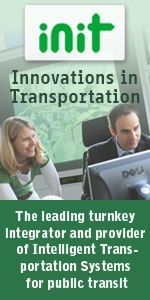

| In This Issue |
| » NEWS HEADLINES |
| » COMMENTARY |
| » APTA NEWS |

The classifieds in this issue offer eight Help Wanted positions, including two chief executive posts!
| COMMENTARY |
The Search for a National Solution to Our Transit Woes
BY DAN GRABAUSKAS AND PAUL REGAN
This article originally appeared May 14, 2010, in The Boston Globe. Reprinted by permission of the authors and the newspaper.
Red Sox and Yankees fans can agree on one thing—how to get to the game. In New York, about 45 percent of ticketholders take public transportation. In Boston, more than 50 percent of ticketholders take the T—a percentage higher than any other professional sports franchise in any city in the country. Yet, even as hundreds of thousands pour into rail cars each season, most are unaware that the trains are running on empty.
From sports and entertainment to banking, health care, and higher education, industry sectors in cities throughout the country are dependent on mass transit. In Boston, nearly 60 percent of all workers in the financial district take the T to work. Yet when it comes to valuing these systems, we are a nation in denial, passive about their economic contribution; lacking the collective will to finance them properly; and oblivious to the certainty of their deterioration if their issues are not addressed.
The MBTA faces a $230 million structural deficit and $543 million in unfunded safety-critical projects, according to a recent report by former John Hancock chief executive David D’Alessandro. By deferring maintenance and taking on debt we cross our fingers on another year of business as usual (with no hope of expansion), after which we may go the way of transit systems around the country that are also retrenching.
According to a 2010 survey by the American Public Transportation Association, 84 percent of all transit agencies have cut service or raised fares in the last year, or plan to do so in the near future. New York City faces a $800 million shortfall, and has implemented a plan to delay maintenance, and cut entire subway lines and bus routes; Chicago, facing a $300 million shortfall, has significantly reduced service on dozens of bus routes and rail lines; Philadelphia has announced a 6 percent fare increase to help close a $110 million operating deficit; and Washington has a $189 million operating deficit for next year, with plans to balance it by using capital funds to pay for operating costs (thus deferring maintenance), as well as reducing some bus and rail service.
These “legacy’’ transit systems are starved by budgets in which escalating and intractable fixed costs outpace combined fare revenues and government subsidies. They are pressured by safety and reliability concerns resulting from deferred maintenance, and they face continuing calls for expansion without regard for how to pay to build, operate, or maintain the extensions, let alone the existing system.
Each of these systems has unique funding demands, management challenges, and politics that have led to their financial woes. Yet, their parallel problems indicate a national crisis. A national transit summit next week in Boston will examine these issues as systemic problems, demanding national strategies and broadly applied solutions. It will also offer a front row seat to the elephant in the room: paying for what we have with what little we’ve got.
Before we can answer the call for expansion, we need to fix what’s falling down. This point of contention among well-intentioned transit supporters must be resolved by prioritizing and sequencing our efforts. To do so, we must make a national shift toward support for repair work. A country brought up on expansion must embrace maintenance as the new manifest destiny.
The federal government must respond in a significant way to the most publicly beneficial example yet of “too big to fail.’’ Radical new funding formulas that will help save these systems must be considered. The reauthorization of the federal Safe, Accountable, Flexible, Efficient Transportation Equity Act: A Legacy for Users (SAFETEA-LU) this fall may be the tipping point on a new era of economic renewal and energy efficiency through well-supported mass transit.
The private sector must step up with financial and political support that goes beyond the self-interest of construction request for proposals. And both the public and private sectors must come together around creative financing strategies that can provide a dedicated, reliable, and growing stream of funding for transit.
Dan Grabauskas, former general manager of the Massachusetts Bay Transportation Authority (MBTA), is senior fellow for public policy at MassInc. Paul Regan is executive director of the MBTA Advisory Board.
| « Previous Article | Return to Top | Return to Main | Next Article » |
|
||||||
| AMERICAN PUBLIC TRANSPORTATION ASSOCIATION |
Telephone (202) 496-4800 • Fax (202) 496-4321
Search Back Issues
